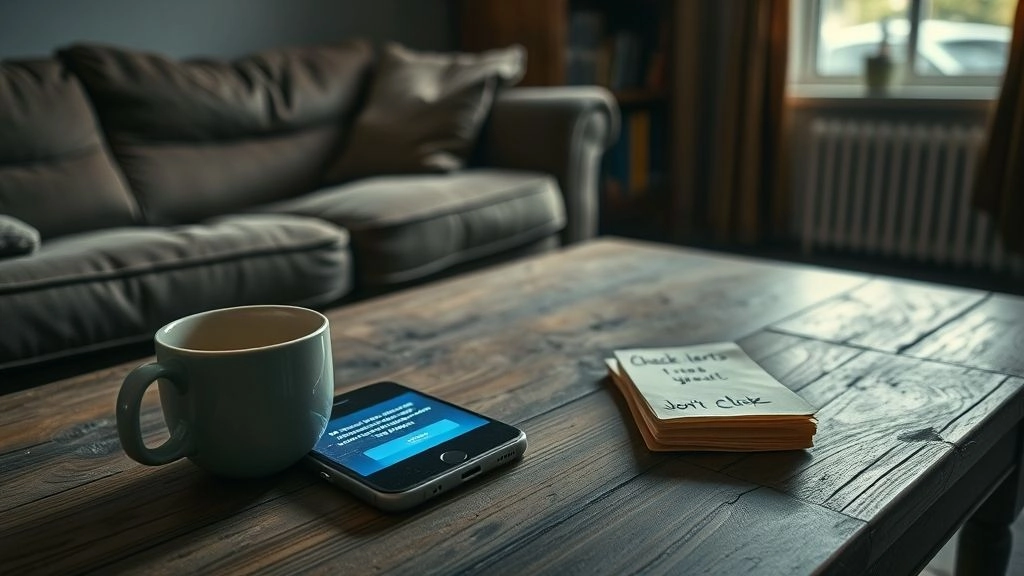Wait, Could This Happen to Me?
Have you ever caught yourself watching your checking account like a hawk, only to get ambushed by something wildly unexpected? That was me not too long ago—smugly convinced I had conquered every money leak, down to the rogue $1.25 “subscription” from an app I didn’t remember. Then, out of nowhere, my best friend called me, voice shaking, saying she was locked out of her bank app. Turns out her bank account had been hacked through her phone number, and it knocked the wind out of both of us.
Let’s be real: most of us think budgeting means just… you know, tracking spendy habits, clipping coupons, maybe obsessing over free money hacks for students. But there’s this other layer nobody wants to talk about. What happens if the clever frugal moves, the number crunching, all come crashing down because a scammer yanked open your front door… using your phone number? Wild, right?
How Scammers Sneak In
So here’s the question that kept me up way past midnight: is it really possible to have your bank account hacked through your phone number? Not just some far-fetched movie plot (except, uh, it’s Money hacker movie levels of stress). Turns out, the answer is… absolutely yes. And it’s happening more than you think digital forensics guide.
But before you panic and throw your phone in the nearest river, let’s break down the sneaky tricks—all in regular-person language.
SIM Swap: Nerdy Name, Major Headache
This one still blows my mind every time. You’ve probably heard “two-factor authentication” thrown around as the holy grail of safety. It is… until a scammer pulls off a SIM swap. That’s when they trick your phone company into porting your number to a clone SIM. Suddenly, all those fancy codes your bank sends to keep you safe? They go straight to the scammer’s device, not yours. Yikes.
I read a case that seriously haunted me for weeks: the victim woke up with zero phone service. But the real horror began when email alerts rolled in about unauthorized bank transfers… and her bank—bless their robotic hearts—kept texting “security codes” to the stolen number finance reporting on port-out hijacking. Imagine your emergency fund getting wiped out, just as you’re dreaming of your next grocery store win.
Phishing and Spoofing: Old Tricks, New Targets
Bank calls that sound just a little off? Odd texts saying your account’s locked and you need to click…now? That’s scammers fishing. They even spoof phone numbers so it looks legit. Sometimes, the scam isn’t high-tech at all—it’s persistence. I saw this wild post where a guy got spam-called nonstop. Distracted, exhausted, he finally gave up and answered. A few hours later? Bank account activity he didn’t recognize. Turns out, the scammer used the chaos as cover to try to change his number on his bank account and slip money out under his nose.
Real Bank vs. Fake Bank: Quick Table
| Red Flag | What Your Real Bank Would Do |
|---|---|
| Calls you for passwords or PIN | Never asks for those, ever |
| Wants you to act NOW! | Gives you time, tells you to verify |
| Sketchy or generic greeting | They use your actual name, not just “Sir/Madam” |
| Sends suspicious links via text/email | Tells you to use their app or official site instead |
Have you ever gotten one of these? Give yourself gold-star frugal points if your first instinct is to double-check before clicking or sharing a thing (advice on fraud reporting).
Malware (Aka, That Sketchy “Money Hack Mod APK”)
Let’s talk about temptation—specifically in the form of apps that promise the world, sometimes with “mod” or “hack” in the name (hello, Money hack Mod APK). Savvy scammers hide malware in links or random app downloads. Open the wrong file, and boom—your banking info is theirs. It’s literally the budget version of giving away your keys for a fake free pizza…
Honestly, protecting your savings is a lot like extreme couponing—tiny steps that save you from big regrets.
Why This Hits Frugal Folks Harder
I know what you might be thinking. “Ok, but I don’t have thousands stashed. I keep my accounts lean. Why would scammers target me?” Because every penny matters—and hackers know it too. For us, losing $50 isn’t just annoying, it could mean skimping on groceries or dipping into that fast-disappearing sinking fund.
It’s not just about the money. It’s the emotional sting—the feeling that you should’ve seen it coming or done something differently. Guess what? That’s normal and totally human. Happened to me—my guard dropped once, and the only thing that saved me was noticing a weird text about a “bank login from new device.” Quick action meant my “fun budget” survived…but for a few minutes there, I pictured cancelling every little treat for months.
Spot the Warning Signs, Save Your Sanity
If your bank account’s ever truly been hacked through your phone number, you’ll know. But it’s not always as obvious as “Congratulations, you’re broke!” Here’s what tipped me off, and what scared friends noticed:
- Sudden loss of phone service (scammers hijacked your SIM? Danger!)
- Weird texts about changing login info or password resets you didn’t request
- Bank notifications—logins, transfers, or changes to your account profile
- Getting asked to verify transactions or codes you never started
I can’t count the times I nervously checked my account “just in case” after a flurry of spam calls. Paranoia? Maybe. But better $0 lost than $500 gone with the pizza money.
Move Fast—But No Panic
Feel that panic? Channel it into action. Call your bank immediately (not the number from the scary text—grab the real one off your card). Lock down your account, freeze it if you can. Then change your passwords, everywhere. And honestly, even if it all feels like overkill, set up every single alert your bank will let you.
An underrated tip: review your linked phone numbers and emails from your banking app right now. Make sure it’s your info—and only yours.
If you’re on a tight budget, throwing money at fancy credit monitoring isn’t always realistic, but check out tools like Money hack real life for tips on monitoring and getting wise to suspicious activity, no monthly subscription required.
Mistakes Happen. Recovery Is Possible.
Ever felt that instant “what did I just DO?” right after clicking a sketchy link or answering a weird call? Yep, me too. Maybe your heart races for a good hour and you spiral about worst-case scenarios—and all you can do is hope you reacted fast enough. But more people recover than you’d think, even after their bank account’s been hacked through their phone number.
Take—let’s call him “Alex”—who accidentally outsmarted a scammer by letting anxiety win for once. He froze his debit card on a whim after a wave of phishy calls, then found out a SIM swap was in progress. That gut feeling (and quick-fingered panic freeze) saved his last $200. Alex’s story is weirdly common, but you don’t need to live on caffeine and nerves. Most banks have (very sleepy) fraud teams who do actually help.
And every time I’ve had to call, they’ve taken me seriously, even if the “loss” was just 99 cents. Why? Because, for budgeters, every single bit matters.
Why Small Steps = Big Protection
Let’s be honest: You can’t outsmart every scammer. But you CAN lock down your phone and habits like you’re protecting the world’s scrappiest savings account. Here are the tweaks I swear by—they’re basically the “free money hacks for students” of security:
- Set SIM PINs. Not just your screen lock, but a code for your actual SIM. Phones can do it—it’s like putting a deadbolt on your dorm room.
- Use authenticators. If your bank offers app-based codes (instead of texts), switch now. Scammers can hijack texts, but not the app.
- Watch where you share. Every store card, quiz, “sign up for discounts” offer? Don’t hand out your number. Use email, or even a virtual number for shopping.
- Keep your socials private. I know, I know—it feels harmless. But data brokers and scammers scrape public info for fun.
- Pay attention to app requests. If an app screams for weird permissions—especially SMS or “draw over other apps”—nope out of there fast.
For more tech-y details, see this “don’t panic” piece from the Norton team on what happens when a scammer has your phone number.
A Few Frugal Extras
Saving money isn’t just about coupon-stacking and DIY haircuts—sometimes, it’s about guarding the cash you already have from the wild world of digital hucksters. Don’t skip the tiny stuff. Want a more dramatic take? There’s even a hilarious disaster movie about it (check out Money hacker movie). For real-world “oops, I survived” tales, there’s Money hack real life—it might just make you laugh at your own near-miss.
Also: never, ever download sketchy “hack” apps promising instant riches. Those “mod” APKs? Most are just Trojan horses for your info (research on hacker methods). They promise shortcuts but guarantee headaches…and maybe a reroute of your entire checking account.
Let’s Wrap This Up—And Guard That Budget
Look, here’s the honest truth: no one is immune. I’d love to say “do X, Y, and Z, and you’ll never hear from a scammer,” but the world just isn’t that tidy. What matters is you get wise to risks like having your bank account hacked through phone number, so you handle it before it handles you.
Don’t let the fear of hackers keep you from enjoying your wins—big or small. Tweak your tech habits, stay a teeny bit paranoid, and always, always, double-check any “urgent” bank thing. Most of all, remember that your hard-earned savings are worth defending with every trick in the book.
If you’ve ever faced a bank scam or had a close call, I’d love to hear your story—or your favorite “save the savings” hack—in the comments. And if you hate thinking about fraud, just stash this post with your receipts and come back when you need a refresher.
Being frugal isn’t just about what you don’t spend. It’s about protecting what you do have. And that, my friend, is the ultimate money hack.












